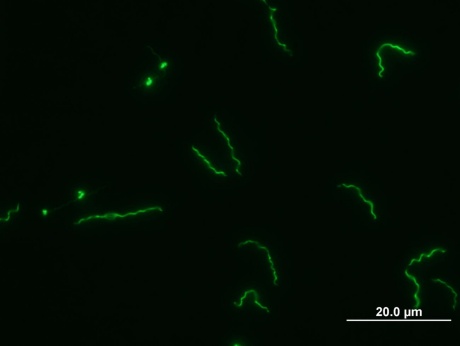
Czech scientists have clarified how Borrelia are transferred from tick to host
08. 08. 2019
Young parasitologists from the Biology Centre of the CAS have announced a crucial discovery regarding transfer of Lyme borreliosis from tick to human. Careful experiments with ticks sucking blood have enabled them to describe the way how Borrelia, i.e. the bacteria causing Lyme borreliosis, are carried from the parasite to its host. Their findings have refuted a dogma that had been widely accepted in world science for decades. The discovery will facilitate development of more efficient vaccines and curing strategies preventing transfer of this serious disease.
“For more than thirty years, the American model was accepted, saying that Borrelia live in the tick’s intestines, and when the tick begins to suck blood, Borrelia move from intestines to salivary glands, and from there, with saliva into the host. We have, however, found out that the reality is completely different,” describes Radek Šíma, one of the main authors of the discovery. He notes that most scientists are still targeting molecules from salivary glands when developing vaccines against Lyme borreliosis. According to him, this is a dead end. “We think that Borrelia go from the intestines through the maw directly into the host, and the tick’s saliva are not important for Borrelia. Therefore, we need to target the tick’s intestines, not its saliva,” says Radek Šíma.
Libor Grubhoffer, director of the Biology Centre of the CAS who has been studying ticks his whole professional life, confirms Šíma’s words. “For decades, we couldn’t find Borrelia in saliva, and we were searching for various explanations. Our young colleagues were not afraid to question the authorities, and they presented compelling evidence that transfer of Borrelia does not occur through saliva. This is undisputedly an important discovery,” states Libor Grubhoffer.
Borrelia are not infectious in the first 24 hours
Borrelia are spiral-shaped bacteria with flagella on both ends, capable to adapt to life inside various hosts. The main reservoir of Borrelia is in birds and rodents. From there, they move to ticks and then back to birds, rodents, but also other mammals including humans. In each host, Borrelia alter their surface – changing their clothes, so to speak – so the immune system does not recognise them. This is also the reason why researches have been unable to develop an antibody that would target these bacteria. The change of surface takes at least 24 hours.
A photo of Borrelia through dark-field microscopy
Scientists from the South Bohemian institute have also disproved the hypothesis that Borrelia do not enter the host within the first 24 hours. “Borrelia move into the host immediately, but during the first day, they are not infectious yet,” explains Radek Šíma. When a tick begins to suck blood, Borrelia receive a signal to alter their surface antigens, or change their clothes. However, the first Borrelia that enter the new host do not have the proper clothes yet, so the immune system discovers them and destroys them. This is why people are not infected with Lyme borreliosis during the first day after a tick begun sucking their blood.
The research, which requires demanding, several months long experiments with vaccines, as well as hundreds of tissue samples for infection analysis, will now continue to ultimately prove the transfer of Borrelia through a tick’s intestines and find intestinal molecules that enable Borrelia to survive and procreate. The research will look for such substances that will suppress Borrelia directly in a tick’s intestines or prevent them to change their surface.
Original Czech text prepared by: Daniela Procházková, Biology Centre of the CAS, in cooperation with Milan Pohl, Department of Media Communication of the Head Office of the CAS
Opening photo: Pavlína Jáchimová, Division of External Relations of the CAS
Photo in the article: from the archives of the Biology Centre of the CAS
Read also
- Evolution, alive and well. What lies at the heart of biodiversity?
- From an evolutionary POV, vision has a great benefit–cost ratio, researcher says
- Badminton buzz: Tournament draws 76 athletes from the Academy’s institutes
- Unique reproductive strategy confirmed in another frog species in Moravia
- Hydrochemist Martin Pivokonský on how to improve water and wastewater treatment
- Involved in groundbreaking research, Ukrainian archeologist now works at the CAS
- The first human presence in Europe securely dated to 1.4 million years ago
- The CAS visited by chess grandmaster and Russian opposition activist Kasparov
- The CAS will support scientists whose research is at risk in their home country
- Unravelling the mystery of biodiversity – with a little help from the fruit fly
The Czech Academy of Sciences (the CAS)
The mission of the CAS
The primary mission of the CAS is to conduct research in a broad spectrum of natural, technical and social sciences as well as humanities. This research aims to advance progress of scientific knowledge at the international level, considering, however, the specific needs of the Czech society and the national culture.
President of the CAS
Prof. Eva Zažímalová has started her second term of office in May 2021. She is a respected scientist, and a Professor of Plant Anatomy and Physiology.
She is also a part of GCSA of the EU.
